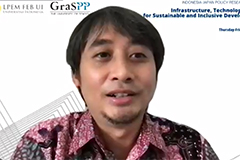Policy Dialogue: Asia's Needs for Social Infrastructure
2021.04.13
The "Policy Dialogue on Infrastructure, Technology, and Finance for Sustainable and Inclusive Development in Asia Beyond the Pandemic," co-hosted by the Asian Development Bank Institute, the University of Tokyo Graduate School of Public Policy (GraSPP), and the University of Indonesia with the support of the Toshiba International Foundation, was conducted online on Feb. 18 and 19, 2021. Hirota Koki, visiting fellow at the JICA Ogata Sadako Research Institute for Peace and Development (JICA Ogata Research Institute), who is also a professor at Saitama University, participated in the dialogue.
With the COVID-19 pandemic reaffirming the importance of having high-quality social infrastructure, the policy dialogue was held with the aim of bringing Asian policy makers, experts and researchers together to discuss what policies are necessary for building resilient, inclusive and sustainable social infrastructure and providing social services, and having these discussions applied to policy making in each country.
Hirota participated as a panelist in Session 1, "Needs for Social Infrastructure in Asia," which was moderated by Nishizawa Toshiro, professor at GraSPP, together with Teguh Dartanto, vice dean on Academic and Research, Faculty of Economics and Business at the University of Indonesia, and Rana Hasan, director of the Economic Research and Regional Cooperation Department (ERCD), Asian Development Bank (ADB).
Dartanto, who used to be a research fellow at the JICA Ogata Research Institute from 2012 to 2013 and is currently conducting research on poverty and development at the University of Indonesia, said that the social infrastructure in Asian countries has been greatly affected by the COVID-19 pandemic, explaining the impact it has had on four aspects: education, healthcare, public housing, and government buildings. He stated that Asia is expected to require the equivalent to 0.5 to 1 percent of GDP for investment for recovery, furthermore in Indonesia, there is a large gap between the existing amount of investment in social infrastructure and the amount required.
Hirota gave his presentation based on the results of a research project by the JICA Ogata Research Institute, entitled "Research on Demand Estimate on Infrastructure in Asia," which he conducted with Dartanto and other researchers. Based on approaches at both the macro and micro level, demand estimates were made for each of the four areas of infrastructure: new construction, operation and maintenance, replacement, and rehabilitation. Hirota reported that there is a large demand in Japan—10.3 to 13.5 trillion yen per year—for replacement, rehabilitation and maintenance, and that it is clear that current levels of spending must be raised to meet this demand. He identified three issues as future challenges: securing funding, developing technology that will lead to reduced maintenance costs, and engaging in long-term planning that takes resilience, spare capacity or redundancy of facilities, and inclusiveness into account. Furthermore, he pointed out that the impact of COVID-19 on social infrastructure includes the acceleration of digitalization and AI, as well as moves toward strengthening resilience to external shocks, noting that the resilience of medical infrastructure, in particular, will need to be enhanced in the future. For example, in the event of a large-scale outbreak, he said that it would be desirable to consider flexible mechanisms such as using governmental and private training facilities to accommodate people who have mild symptoms or are asymptomatic.

Teguh Dartanto of the University of Indonesia explained the impact of the COVID-19 on various aspects

Visiting Fellow Hirota Koki gave his presentation based on the results of a JICA Ogata Research Institute research project
In the ensuing question and answer session, Hirota answered the question on how limited resources for social infrastructure should be used. He said that it is important to improve cost efficiency based on the lifecycle cost, which is also advocated in "Quality Infrastructure Investment," and that as the growing interest in the SDGs is a good opportunity, it is desirable to make greater use of public-private partnerships (PPPs) in order to mobilize private capital for investment in social infrastructure.

事業事前評価表(地球規模課題対応国際科学技術協力(SATREPS)).国際協力機構 地球環境部 . 防災第一チーム. 1.案件名.国 名: フィリピン共和国.

事業事前評価表(地球規模課題対応国際科学技術協力(SATREPS)).国際協力機構 地球環境部 . 防災第一チーム. 1.案件名.国 名: フィリピン共和国.

事業事前評価表(地球規模課題対応国際科学技術協力(SATREPS)).国際協力機構 地球環境部 . 防災第一チーム. 1.案件名.国 名: フィリピン共和国.

事業事前評価表(地球規模課題対応国際科学技術協力(SATREPS)).国際協力機構 地球環境部 . 防災第一チーム. 1.案件名.国 名: フィリピン共和国.

事業事前評価表(地球規模課題対応国際科学技術協力(SATREPS)).国際協力機構 地球環境部 . 防災第一チーム. 1.案件名.国 名: フィリピン共和国.
scroll